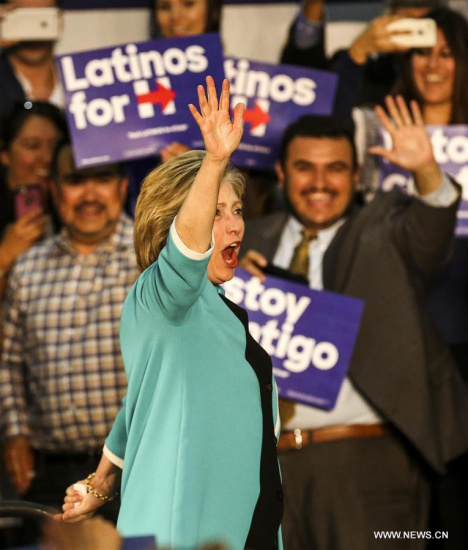
Democratic presidential candidate Hillary Clinton gestures as she campaigns at East Los Angeles College in Los Angeles, the United States, May 5, 2016. (Xinhua file photo/Zhao Hanrong)
U.S. FBI Director James Comey said on Tuesday his agency would not recommend criminal charges against Hillary Clinton for her use of a private email server as secretary of state but called Clinton and her team "extremely careless" in handling sensitive information.
The announcement, which came only about 72 hours after FBI agents interviewed Clinton, the presumptive Democratic nominee for the 2016 presidential election, dispelled a huge legal cloud over her campaign.
Comey said federal investigators found that 110 emails in 52 email chains had contained classified information at the time they were sent or received and that eight of those 52 chains "contained information that was top secret" when they were sent.
Apart from the approximately 30,000 work-related emails Clinton turned over to the State Department in 2014, investigators later discovered several thousand work-related e-mails that were not among the group of 30,000 e-mails, Comey told a press conference.
"With respect to the thousands of e-mails we found that were not among those produced to the State Department, agencies have concluded that three of those were classified at the time they were sent or received; one at the secret level and two at the confidential level," he said.
However, Comey said there was no clear evidence that Clinton and her aides intended to violate the law.
"Although there is evidence of potential violation of the statutes regarding the handling of classified information, our judgment is that no reasonable prosecutor would bring such a case," said Comey.
The Clinton campaign immediately welcomed the announcement, saying it was pleased with the FBI decision. But it also admitted that Clinton had made a mistake by relying solely on a private email setup to deal with work-related emails.
"As the Secretary has long said, it was a mistake to use her personal email and she would not do it again," said the campaign in a statement.
As for the several thousand additional work-related emails not handed over to the State Department by Clinton in 2014, Comey said the FBI found no evidence that any of the additional work-related e-mails were intentionally deleted in an effort to conceal them in some way.
"Our assessment is that like many e-mail users, Secretary Clinton periodically deleted e-mails or e-mails were purged from her system when devices were changed," said Comey.
The controversy surrounding Clinton's email practices again burst into public view in August 2015 after the inspector general for the intelligence community revealed that two of the thousands of emails held by Clinton contained top-secret information.
Clinton first acknowledged that her use of a private email system while helming the U.S. State Department was a "mistake" in September, six months after her practice was disclosed by a Republican-controlled Congressional committee which investigated events leading up to the 2012 Benghazi attacks that claimed four American lives, including the U.S. ambassador to Libya.
The FBI's recommendation on Tuesday immediately drew criticism from Republicans, with House Speaker Paul Ryan questioning whether "damage is being done to the rule of law" in the case.
"No one should be above the law," said Ryan in a statement. "Declining to prosecute Secretary Clinton for recklessly mishandling and transmitting national security information will set a terrible precedent."
Comey has in the first place defended the FBI investigation as being done "honestly, competently and independently."
"I know there were many opinions from people who were not part of the investigation, including people in government. But none of that mattered to us," said Comey. "No outside influences of any kind was brought to bear."
Early this year, U.S. President Barack Obama weighed in on Clinton's intent of using a private email setup during her stint at the State Department.
He told Fox News in an interview that he believed that Clinton did not intentionally endanger national security in her handling of classified information.
The remarks immediately raised concerns that the federal investigators could be swayed by the president's view on the issue.
The FBI announcement came just hours before Clinton's first joint campaign appearance with President Obama and only about a week after former U.S. President Bill Clinton had a private meeting with Attorney General Loretta Lynch.
The 30-minute meeting on June 27 at the Phoenix International Airport in Arizona, which Lynch described as primarily social, raised concerns about a potential conflict of interests.
According to ABC News who first disclosed the meeting, Mr. Clinton waited for Lynch's arrival after being notified that she would be arriving at the same airport. Mr. Clinton approached Lynch and initiated the unplanned chat.
Speaking on Friday at Aspen Ideas Festival in Aspen, Colorado, Lynch indicated her regrets about not having turned down the former president.
She also announced that she "fully" expected herself to accept recommendation by FBI investigators on whether to bring charges related to Hillary Clinton's personal email setup.
Lynch said her decision to accept FBI recommendation was made long before her impromptu chat with Mr. Clinton.
In March 2015, Clinton acknowledged that she had exchanged about 60,000 emails from her private email account during her stint in the Obama administration, among which about half were personal and thus deleted.
All emails were sent and received via a private email server based at Clinton's home.
In response to requests from the State Department, the Clinton camp turned over the other half, roughly 30,000 emails in total, to the State Department in December 2014.


















































